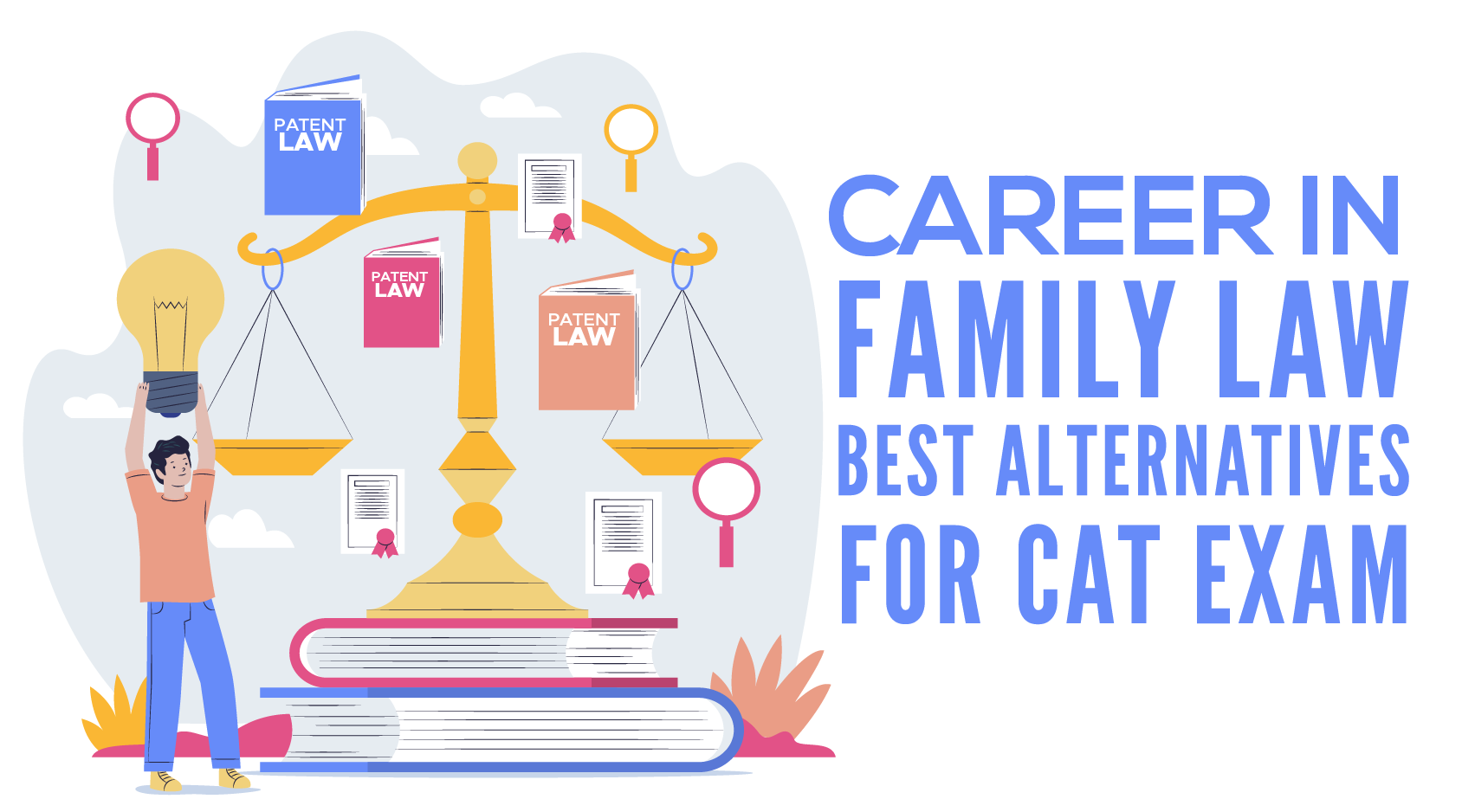Family Law focuses on the topics related to family matters such as divorce, abuse, custody of children, financial matters, etc. This course also concerns with areas related to tax, contracts, real estate, partnership law, and many other fields relating to family affairs. This course for those students who have a desire of getting specialization in Family Laws and handling legal matters related to the family. Students who wish to seek a degree in Family Laws should have skills like problem-solving abilities, analytical and logical thinking and they should also have an enthusiasm for doing something good for society.

Highlights:
| Course Name | Family Law |
|---|---|
| Course Level |
Undergraduate/Bachelor Degree:
Postgraduate/Master's Degree: LLM in Family Law |
| Duration |
LLB (Honours) Family Law - I: 3 Years BBA LLB (Honours) - Family Law - II: 5 Years LLM in Family Law: 3 Years |
| Examination Type | Semester |
| Eligibility | Varies with degree |
| Admission Process | Merit/Entrance Based |
| Top Recruiter | Supreme Court of India, Govt. of India Offices, District Courts, High Courts, NGOs, Private Law Firms |
| Top Career Scopes | Legal Advisor, Lawyer, Law Inspector, Judge, Magistrate, Lecturer/ Teacher |
Top Colleges
- National Law University
- SGT University
- Amity University
- Punjabi University
- Arunachal University of Studies
- Nalsar University of Law
- Jindal Global Law School
Eligibility:
| Course Name | Duration | Eligibility | Entrance |
|---|---|---|---|
| LLB (Honours) Family Law - I | 3 Years |
|
CLAT, AILET, DU LLB, University Self Conducted Exams |
| BBA LLB (Honours) - Family Law - II | 5 Years |
|
CLAT, AILET, University Self Conducted Exams |
| LLM in Family Law | 3 Years |
|
CLAT, AILET, LSAT, ILI CAT, University Self Conducted Exams |
Syllabus:
The syllabus of Family Law may differ across various colleges, however, some of the core modules remain the same. The course curriculum/syllabus for Family Law has been mentioned below:
Modules Covered in LLB (Honours) Family Law - I
| Module 1 - Introduction to Personal Laws | Module 2 - Marriage Laws |
|---|---|
|
Sources of Hindu Law:
|
Marriage Under Hindu Law:
|
|
Sources of Muslim Law:
|
Marriage under Muslim Law:
|
| Schools of Hindu Law & Muslim Law |
| Module 3 - Dissolution of Marriage | Module 4 - Maintenance and Adoption | Module – 5 Guardianship |
|---|---|---|
| Judicial Separation & Restitution of Conjugal Rights |
Maintenance under Hindu Law:
|
Guardianship of person
|
|
Dissolution of Marriage under Hindu Law:
|
Maintenance under Muslim Law:
|
Guardianship of minors property |
|
Dissolution of Marriage under Muslim Law:
|
Adoption under Hindu Law:
|
Defacto Guardian |
|
Guardianship under Muslim Law
|
Modules Covered in LLB (Honours) Family Law - II
| Module I - Hindu Joint Family and Coparcenary | Module 2 - Property | Module 3 - Partition |
|---|---|---|
| Meaning, Characteristics &Distinction between Hindu Joint Family and Coparcenary | Classification of Joint Family Property – Ancestral, Doctrine of Accretion, Doctrine of Detriment, Doctrine of Blending | Meaning of Partition, De Facto & De Jure Partition |
| Distinction between Mitakshara & Dayabhaga Coparcenary and Changes introduced by The Hindu Succession (Amendment) Act, 2005 | Separate or Self Acquired Property & its Sources | Subject matter of Partition & properties not capable of partition |
| Rights of Coparceners and Position of Female Coparceners | Property inherited from Maternal Grandfather, Gift of Self acquired property by Father to Son, property inherited from Father under Hindu Succession Act, 1956 and Concept of Gains of Learning | Persons having Right to partition& Persons entitled only to Share in Partition |
| Karta – Position, Powers and Rights & Duties | Alienation of Hindu Joint Family Property – Karta’s & Coparcener’s Power of Alienation & Right to Challenge unauthorized Alienation | Mode of partition & How Partition is effected |
| General Rules of Inheritance & Classification of Heirs under the Shia Law & Sunni Law | Revocation, Re-opening, and Re-union of Partition |
| Module 4 - Hindu Law of Succession | Module 5 - Gift (Hiba), Wills (Wasiyat) & Waqfsunder Muslim Law |
|---|---|
| Succession to Separate/ Divided property of a Hindu Male dying intestate – class I, class II heirs, Agnates & Cognates | Meaning &Essentials of a Valid Gift |
| Succession to Mitakshara Coparcener’s undivided interest | Irregular Gift (Mushaa), Gift of Exchange ( Hiba - bil - iwaz), and Revocation of Gifts |
| Disqualifications under the Hindu Succession Act & its effect on Succession | Object & Essentials of a Valid Will under Muslim Law |
| Hindu Woman’s Property under S.14(1), S.14(2), S.15(1), S.15(2) of Hindu Succession Act, 1956 | Difference between Sunni Law & Shia Law on Will |
| Wakfs & Essentials of Waqfs under Shia & Sunni Law and Doctrine of Cypres |
LLM in Family Law
| Subject Name | Subject Name |
|---|---|
| Family Law I – System Scope Sources and Schools [Specialization Elective Courses] | Family Law III – Nuclear and Extended Family Rights [Specialization Elective Courses] |
| Family Law II – Marriage and Matrimonial Remedies [Specialization Elective Courses] | Family Law IV – (Penal Laws on Family Affairs) [Specialization Elective Courses] |
| Comparative Public Law [Core Courses] | Family Law V – Family Property and Succession [Specialization Elective Courses] |
| Law and Justice in Globalizing World [Core Courses] | Family Law VI – Family Disputes Resolution [Specialization Elective Courses] |
| Legal English and Research Methodology [Core Courses] | Dissertation [Non-Teaching Credit Courses] |
| Foreign Business Language | Foreign Business Language |
| Open Elective Courses | Outdoor Activity-Based Courses |
Admission Process:
It's very important for the student to understand the admission process of a particular college before applying for a degree in Family Law. There are many institutions that offer Family Law on the basis of marks secured in a specific entrance exam (National/State Level). However, some institutes have their own entrance examinations (University level Entrance Examination). Still, there are a few colleges that have merit-based selection procedures where applicants are selected on the basis of marks secured in their last academic period.
Top Entrances:
1. CLAT
- Exam Mode: Offline mode (Pen & paper-based test)
- Exam Duration: 2 hours
- Total Marks: 200
2. AILET
- Total Number of Questions: 150
- Duration of Exam: 90 minutes
- Eligibility: Aspirants should complete LL.B. or an equivalent degree with 55% marks (50% in case of SC/ST/ Persons with Disability). Candidates appearing in the final year exam of LL.B are also eligible to register for AILET 2018 exam.
3. LSAT
- LSAT 2020 is replaced as LSAT-Flex
- Exam Mode: Online (Digitally)
- Type of Questions: MCQ (Multiple Choice)
4. DU LLB
- Exam Mode: Online
- Exam Duration: 2 hours
- Marking Scheme: +4 marks for a correct answer, -1 mark for an incorrect answer
6. ILICAT
- Exam Mode: Offline i.e. Pen and Paper-based
- Number of Questions: 160
- Exam Duration: 2.5 hrs
Career Scope:
| Career/Job Profiles | Average Salary/Annum |
|---|---|
| Legal Advisor | Rs 4 - 8 Lakhs |
| Lawyer | Rs 3 - 6 Lakhs |
| Law Inspector | Rs 4 - 7 Lakhs |
| Judge | Rs 8 - 15 Lakhs |
| Magistrate | Rs 5 - 8 Lakhs |
| Lecturer/ Teacher | Rs 3 - 6 Lakhs |
Top Recruiters:
- NGOs
- Govt. of India Offices
- District Courts
- High Courts
- Supreme Court of India
- Private Law Firms
Top Recruiting Cities:
- New Delhi
- Bangalore
- Mumbai
- Hyderabad
- Chennai
- Ahmedabad
Trending job roles:
Students can explore some of the most popular job roles in this category.
Professor (Family Law):
Being a Professor in Family Law, one has to have an in-depth knowledge of the domain. He/She must hold at least a Masters's degree.
- Starting salary: 2.3 lakh per annum (pa)
- Mid-level salary: 4.7 lakh pa
- Senior-level: 9.9 lakh pa
Family Advocate:
He/She evaluates the current situation of a family in distress, and gives the needed recommendations to the court for further action such as guardianship of a child, and so on.
- Starting salary: 3 lakh per annum (pa)
- Mid-level salary: 6 lakh pa
- Senior-level: 10 lakh pa
Divorce lawyer:
The lawyer assists their client to decide on whether and how they will end their marriage in a legal way. The lawyers are also involved in dealing with cases relating to will, trusts, custody of the child, and so on.
- Starting salary: 3.5 lakh per annum (pa)
- Mid-level salary: 5.5 lakh pa
- Senior-level: 10.5 lakh pa
Important books to follow:
| Books | Author |
|---|---|
| Family Law in India | Prof. GVC Subba Rao |
| Halsbury’s Laws of India | LexisNexis |
| Family Laws in India (Hindu, Muslim, Christian & Parsi Law) | Dr. S.R.Myneni |
FAQ's:
Q: What is the Family Law course?
A: Family Law focuses on the topics related to family matters such as divorce, abuse, custody of children, financial matters, etc. This course also concerns with areas related to tax, contracts, real estate, partnership law, and many other fields relating to family affairs.
Q: What are the top colleges that provide a degree in Family Law course?
A: Some of the top colleges are mentioned below:
- National Law University
- SGT University
- Amity University
- Punjabi University
- Arunachal University of Studies
Q: What are the top entrances to consider for a degree in Family Law course?
A: Some of the top entrances are mentioned below:
Q: What are the top career profiles after a degree in Family Law course?
A: Some of the top career profiles are mentioned below:
- Lawyer
- Legal Advisor
- Family Planning Advisor
- Judge
Q: Who are the top recruiters in the field of Family law?
A: The top recruiters in this field are as follows:
- NGOs
- Govt. of India Offices
- District Courts
- High Courts











